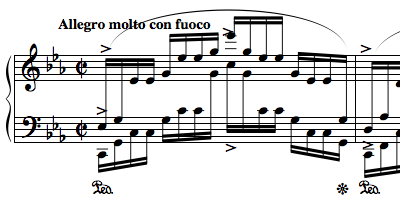Étude Op. 25, No. 12 (Chopin)

Étude Op. 25, No. 12 in C minor is one of Frédéric Chopin's formal studies for the piano, opus 25, dedicated À Madame la Comtesse d'Agoult. It was first published in 1837 in French, German, and English. In the first French edition, the time signature is 4/4, but most recent editions of this piece follow the manuscript and German editions, which indicate cut time.[1] This work is a series of rising and falling arpeggios in various chord progressions from C minor. It is sometimes nicknamed the "Ocean" étude.[2][3]
Structure
[edit]The entire work, except the coda, consists wholly of semiquaver (sixteenth note) arpeggios, spanning large lengths of the keyboard in the space of one bar. The initial theme is expounded upon and changes to many different keys. The climax resolves to C major.
See also
[edit]Notes
[edit]- ^ Palmer, W: Chopin Etudes for the Piano, page 126. Alfred Publishing Co., Inc., 1992
- ^ "Ocean Etude: A Study in Uncharted Emotional Depths". 4 August 2015.
- ^ Chopin Études, Schirmer edition, 1916. 'This piece, too, has recently fallen a victim to the prevalent mania for bestowing titles, now being called the "Ocean Étude." This argues poverty of invention, for ocean-waves do not always run mountain-high.'
External links
[edit]- Études Op. 25: Scores at the International Music Score Library Project
- Op. 25, No. 12 played by Alfred Cortot
- Op. 25, No. 12 played by Claudio Arrau
- Op. 25, No. 12 played by Vladimir Ashkenazy
- Op. 25, No. 12 played by Maurizio Pollini
- Op. 25, No. 12 played by Grigory Sokolov

